Issue 18: Russell Crowe Wants Good Press at Any Cost
If Russell Crowe asked you to be his one-client publicist, would you accept the offer?
I have a strong memory of the first time I saw the photograph of Russell Crowe being perp walked out of an NYPD precinct in 2005. Having watched Gladiator a lot due to my adolescent obsession with Joaquin Phoenix (shut up, leave me alone), I was fascinated to see Maximus himself being accompanied by a pair of cops, handcuffs behind his back, as the paparazzi swarmed him. The headlines were giddy, mocking Crowe as a diva thug who got into endless "altercations." In June 2005, he was arrested and charged with second-degree assault and fourth-degree criminal possession of a weapon after he threw a phone at the concierge of the Mercer Hotel. The concierge required treatment for a facial laceration. Crowe pleaded guilty and was conditionally discharged. Before the trial, he settled a lawsuit filed by the concierge, Nestor Estrada. The terms of that settlement were rumoured to include a payout of at least six figures.
Crowe would go on to describe this as the lowest moment of his life. It certainly felt like a shift in his career and public image. Crowe had never been known as a "good boy", so to speak. He'd been involved in a number of incidents where he swung his fists around or berated people in public. This was different. That perp walk became the defining image of his persona. Talk-show hosts made endless gags about it. South Park did a very funny episode lampooning him. The former golden boy of Australian cinema, the Oscar winner who was in the midst of a critical hot streak, was suddenly a joke. Things didn’t get better from there, not when a 2006 article revealed the sheer maniacal nature of fame, publicity, and making headlines.
Sydney Morning Herald. "I Was Russell Crowe's Stooge." June 7, 2006. Jack Marx.
Writer Jack Marx received an unexpected phone call from Russell Crowe after writing an article about how "the celebrity magazines make up lies." Marx was a long-time journalist who wrote for a variety of Australian publications, usually focusing on music. While freelancing for the Australian edition of Rolling Stone, he became notorious for admitting he hadn't listened to the albums he was assigned to review. While working as a music journalist, he ended up searching for his childhood hero, singer Stevie Wright, and found him living as a recluse struggling with drug addiction. The book Marx wrote about his time with Wright, titled Sorry: The Wretched Tale of Little Stevie Wright, became a big hit but inspired division among readers and critics alike. Was it a wild piece of gonzo journalism or pure exploitation of a man in need or serious help? Even the book’s biggest supporters had to admit that Marx was, at best, toeing the line of journalistic ethics. It’s typically a bad idea for the writer to make themselves the main character in someone else’s story, although it’s an attitude that has inspired a slew of fascinating celebrity profiles. Marx’s whole thing seemed to be this kind of pseudo-provocative first-hand view of the seedy side of the business. He wasn’t alone in this field but in an era where celebrity coverage had grown particularly nasty, he seemed right at home.
After a dinner slash interrogation from Crowe, he received an invitation from Crowe, via his personal assistant, to attend a South Sydney Rabbitohs game (at the time, Crowe was the team's joint owner.) Marx said that, after this match, wherein Crowe was "charming", he and his wife "agreed to play along with Russell Crowe no further. His world was no place for us. But the calls continued." Eventually, the allure of Crowe became too much, and Marx thought of the clout and financial safety net that could be provided from a close relationship with a man who was, "next to the Prime Minister and the odd media magnate", one of Australia's most powerful men.
But this also meant something terrifying: he had to listen to Crowe’s music. Crowe actually started out in musical theatre, performing in shows like Blood Brothers and The Rocky Horror Show, but his voice has never been one that people clamour to hear more of. We all saw Les Misérables, yes? Even when Crowe was popular, his rock band was a joke. They were called 30 Odd Foot of Grunts, for f*ck's sake! Big Hollywood stars doing a musical side-project tends to be viewed as the height of vanity, even if the music is good. Scarlett Johansson’s Tom Waits covers album is surprisingly decent, for example. But the American entertainment industry still views multi-pronged talents like this as doing too much, unlike, say, East Asian and Indian cinema, where everyone is expected to release a ton of albums alongside movie work. Crowe being a deadly serious actor who also had a rock band he committed to with equal importance, and who was viewed as being not great at it, meant the jokes wrote themselves.
(The temptation to illustrate this entire issue with South Park screenshots was high…)
Certainly, getting the former music critic who gave negative reviews based on cover art was an interesting approach to one’s career ambitions. To make things weirder for Marx, he was led into Russell’s “den” at his gorgeous pier-side home to listen to the CD before offering his thoughts to the man himself. He wasn't a fan of what he heard: "It's fair to say Russell's music was a surprise. Where I had expected a lumpen, tuneless racket, what I heard instead was something far less remarkable."
But the music is why Marx was there. Crowe wanted him to be a “champion”, which is a nice way of saying a publicist. Marx described the offered gig as that of "a guerrilla publicist - a plumber, of sorts, plugging up leaks in media goodwill, pressing his music into the ears of journalists whose opinions were hamstrung by prejudice. The rest of the world, then, would follow. He wondered if I could be such a champion." One wonders why Crowe picked Marx, who was smart enough to try and put the actor off by getting him to read the book on Wright. He said he did this because he "felt a duty to admit to him who I really was, like a new lover disclosing a history of herpes." But he also said he’d consider the offer.
There is a fascinating shamelessness to this transaction, right? An actor wants good headlines, so he seeks out a journalist with a history of bucking the industry’s demands to suggest he spin away negative headlines. Much has been said about the largely unspoken of relationship between celebrities and the press (often in this very newsletter.) Publicists work hard for the money, and willing publications can help to clean up all manner of messes. Even in the era of social media and celebrities keeping a tight rein on their own images, a classic People Magazine exclusive can help you out of a sticky situation. Imagine if Crowe had sat down for a sad-faced exclusive interview after that arrest. You can see the nice knitted sweater and hear his regretful apologies already, admit it.
It's Crowe’s eagerness to get Marx to agree that make him seem if not desperate then at least a bit too eager. He’s dogged but also very quick, barely waiting for Marx to get home before asking if he’s played the CD of his music for his wife yet. Still, Marx agrees to be his champion. "I found him clever and engaging, not at all the buffoon of modern legend," he wrote. "I was charmed for sure and, if I were a woman, I thought, I would fall for him madly. As a grown man, I felt I could trust him. Unless he was a very good actor."
(RIP the Dark Universe. You were too pure for this world.)
Eschewing the hefty payday offered by Crowe, Marx began his street team campaign for Crowe’s music career. Said Marx: "I had fashioned a complex argument based mostly on negatives: Why shouldn't Russell's music be heard? Was it not as meritorious as half of the crap that rocks around the clock today? If one weren't to know it was Maximus singing, would one still be wracked with sniggers and snot?" It doesn't go well. His colleagues either laugh in his face or listen with "pained smiles, like friends of the critically terminal patient who swears it really is a wonderful world."
Marx isn’t shy with praise for Crowe, who he frequently describes as charming and entertaining, especially when he’s regaling people with stories of his hot-shot life and the actors he’s worked with. But he’s also clearly a spoiled brat who’s gotten too cushy with the Hollywood lifestyle. At one point, during a meeting with Marx, he beckoned over one of his many “minions” for some cheese and crackers. When he deemed said crackers to be slightly stale, he picked up the phone and called for replacements from the kitchen. It’s hard to make stuff like that seem charming, especially when all you have in your mind while reading it is that concierge having a phone flung at his face.
It's this incident that looms over the entire piece, although it had yet to happen when Marx first met Crowe (which makes his need to control the press around him all the more glaring.) Getting Marx to help with his publicity problem makes sense, but Crowe also seemed to be "running his own parallel, one-man PR fix-it campaign." He called up journalists personally to chastise them for what he saw as inaccuracies in their coverage of him. He bragged to Marx about the time he had gotten a "prominent Sydney gossip columnist" to change her tone to a pro-Crowe one by offering an exclusive interview. Despite being part of this "nonsense", Marx is clearly troubled by it, or he at least thinks it's beneath an Oscar-winning millionaire.
"There was nothing morally corrupt about this, but I found it a silly pastime for a man of his stature. Sometimes it did him no service at all." Marx isn't wrong. It can be terrifying to have the star call you up and demand you be nicer to them but if you're the writer or editor, why would you comply? That gossip columnist probably saw a hit to her reputation after letting Crowe walk all over her. If I was an editor, I wouldn’t stop negative coverage. Hell, I’d probably increase it, knowing how it could be milked for more sales or page views. This is why you get a publicist. It’s their job to roll around in the mud, not yours.
Halfway through the piece, Crowe bids Marx farewell as he leaves Australia for America, where he was set to shoot the boxing biopic Cinderella Man. And then the phone was thrown. Marx emailed Crowe to ask if he needed help, which Crowe declined. The next day, the Australian press was… well, according to Marx they were all very sympathetic towards Crowe. Oh gee, I wonder how that happened. Clearly feeling uncomfortable with this dynamic, Marx said he chose to sit out future Crowe opportunities, but Crowe seemed to have other ideas.
(Cinderella Man is fine.)
A major Sunday magazine emailed him, asking when he would be submitting his story on Crowe from the set of Cinderella Man. He'd agreed to no such interview, but Crowe had requested Marx by name without actually asking him. He wanted to promote Marx to a new position, part of his "Machiavellian plan" to style the writer as a "one-client publicist" for Mr. Grunt himself. He was wined and dined by Crowe, introduced to the family, and listened to even more of Crowe's music. But Marx didn't want to be constantly on call to berate journalists on behalf of Maximus. Who would? He was also seeing other journalists on the side, looking for the right fit, something that Marx admits made his ego shrink. If he had any delusions about their relationship being one of friendship, that was soon put to rest. What if all of this schmoozing and charm was just for a movie promotion?
And Marx did write a positive story about Crowe, one that "betrayed my memory, and thus betrayed my journalism." He didn’t include the details about his rudeness, his diva antics, or his Murdoch-esque approach to ethical press. In other words, a typical celeb puff piece. "I added to the international gallery of portraits casting Crowe as the Great Misunderstood." It wasn’t all lies, by his own admission, because he really did find Crowe to be charismatic and talented. But a half-done portrait is just that.
Having submitted the article that made him queasy to write, Marx decided to email Crowe again, hoping that he wouldn't have too many problems with the piece. He signed it off "by saying I would be delighted if he wished to continue our friendship but, if not, it had been great getting to know him." Crowe's response? "Yeah, yeah, whatever." That's the three-word reply that Crowe claims to be the "lowest insult" of all, the phrase that the concierge had uttered before Crowe assaulted him. He knew what he was doing by sending that to Marx. It's petty and pointed.
A follow-up email from Crowe was far crueler, declaring that Marx's work was "low and sh*tty" and that their friendship, if it was ever that, was truly over. His final email ended, "You should stop jerking off, Jack, and just write books. It is what you are supposed to do." Well, Crowe certainly handed him a great story, one with a ton of amazing beats and a grand theme of how ego and fame can make even the nicest person into a paranoid weirdo "swollen with lust for praise, needlessly bluffing his way into good books and buying his way out of bad."
Adds Marx, "All the world's a stage, it seems, and an elite few are aware of the plot." This is the line I kept returning to with this piece. We often wonder how celebrities can be so staggeringly lacking in self-awareness. Fame is a disconnecting curse that leaves to afloat from reality. Live inside that bubble long enough and you too would end up in a strange mindset. Marx is talking about how the higher-ups on the social latter know the rules more keenly than the general public, but I’m not sure I’d describe Crowe as being in on the wider plot of his career. Cozying up to journalists to avoid bad press clearly worked for a long time, but in the long-term, it just painted him as needy and manipulative and single-minded. This is what you do in your spare time?
Marx's story ended up being a huge hit. Initially published online, it made Australian media history by becoming the first story to leap from digital to print, and eventually won a Walkley Award, one of the biggest prizes in Australian journalism. Questions were asked about the potential ethical issues of publishing such a piece, but largely, the coverage was a lot of people going, “Wow, Russell Crowe sure seems like a d*ck.” I can’t claim I would have done differently had I been in Marx’s shoes. It is a great story and with the Everything is Copy ethos, why wouldn’t you spill the beans? It also seems like a moment of retribution, both for Marx and for every journalist who was strung along by Crowe for his personal benefit. The bylines were so not worth it if everyone knew you’d done it because the guy from Romper Stomper bought you a pint.
It’s fascinating reading this piece in 2024, when Russell Crowe is now considered kind of cuddly and in on his own joke. His film choices have gotten noticeably schlockier, a far cry from the days of working with the likes of Mann and Scott, but he’s also usually the best thing in them. This guy was in The Pope’s Exorcist AND The Exorcism, which I’ve been reliably informed are indeed two different films. He’s giving it his all while simultaneously not giving a f*ck, having proudly admitted he no longer wants to get needlessly buff for work and is happy to be schlubby and middle-aged. It's not all bad. He's great in The Nice Guys, a movie that deserved at least six sequels. He also got great reviews for playing Roger Ailes in the miniseries The Loudest Voice. Still, it feels like he's in his Marlon Brando "just give me my money" era. But you can’t be mad about it when he doesn’t seem mad.
(Russell Crowe as an Italian exorcist who goes around fixing demonic possessions on his Vespa is peak male performance.)
It’s a great way to wash away those years of being called a diva jerk who is willing to swing his fists rather than talk. Crowe is now 60. His kids are adults. He’s known for being a patron of his local rugby and Australian football teams, and he hilariously got the Australia Zoo to name a koala chlamydia treatment ward after John Oliver. When he got divorced, he was open about how the auction of his film memorabilia was a way to pay those bills. Maybe he got tired of being a d*ck? Or perhaps he knew that all those years of being a douchebag would catch up on his career and he just has to take the rough with the smooth.
His tactics, while blunder-headed and egomaniacal, are still in use. Every tabloid that calls Angelina Jolie a harpy and bad mother while the man accused of assaulting her is heralded as a hunky hero chose which publicist to cuddle up to. If someone writes something vaguely critical about Taylor Swift, Tree Paine is released into the wild to refute it in record time. It’s easy enough to get the major publications to fall in line if they don’t want to risk losing access to the stars. I think a lot of writers would still be bowled over enough by a personal invite from a celebrity to take up any request they demanded (although I wonder if journalists would even be the first port of call when TikTokers and influencers are now at the top of the bill for big movie publicity campaigns.) Stars shine so much brighter than the rest of us. They’re needy. But it works best when they make someone else do the begging.
Thanks for reading. You can find my work scattered across the internet. Over on Pajiba, I talked about that John Krasinski cover, plus Us Weekly’s surprisingly candid coverage of the Hugh Jackman-Sutton Foster affair, and why it’s okay to turn your BlueSky account into an echo chamber. Also, would you buy this banana for $1 million? For Inverse, I wrote about the 40th anniversary of an underrated horror-comedy (and Christmas classic), The Night of the Comet. I reviewed the newest Hulu series, Interior Chinatown, for TheWrap. The film of Interview With the Vampire turned 30 so of course I wrote about it for The AV Club. Also for The AV Club, I delved into Amazon’s growing Citadel franchise and whether or not the expensive bet is paying off. If you’re enjoying Rivals on Hulu/Disney+, I did a quick dive into Jilly Cooper’s bonkbusters for Paste.
If you’d like to support my work, please consider subscribing to the newsletter, paid or free. The former comes with a lot more goodies, I promise! Otherwise, you can also make a donation to my Ko-Fi page.

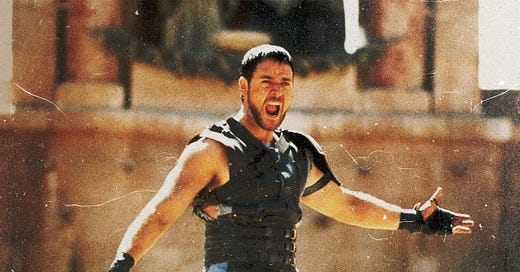



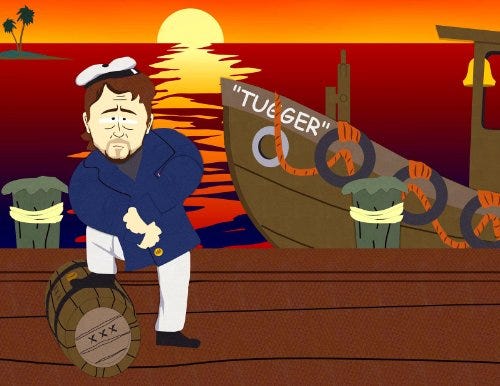
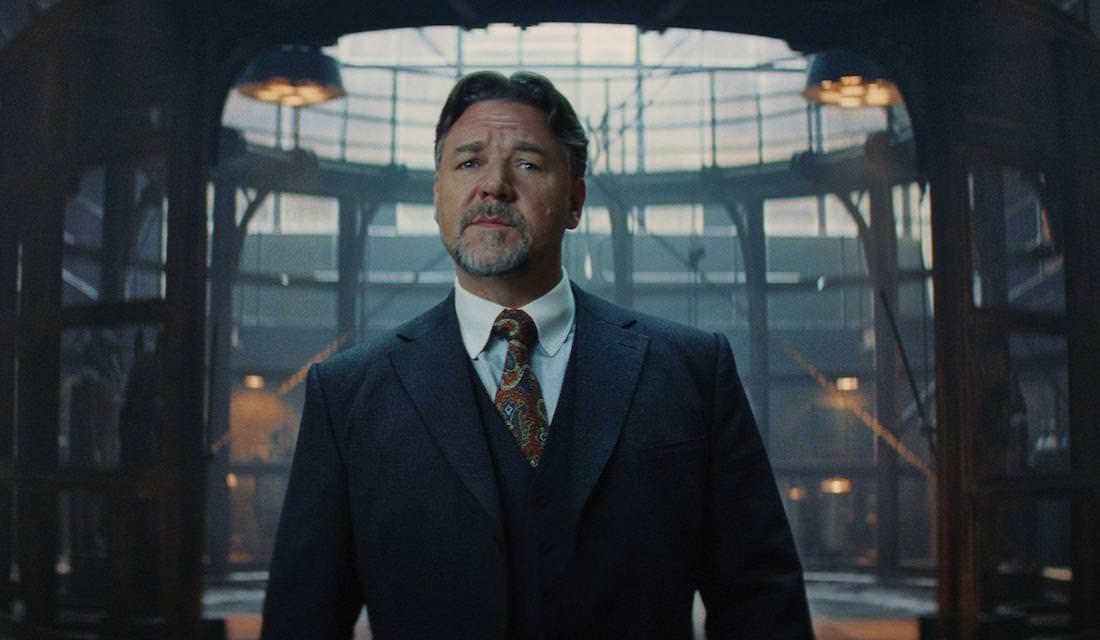
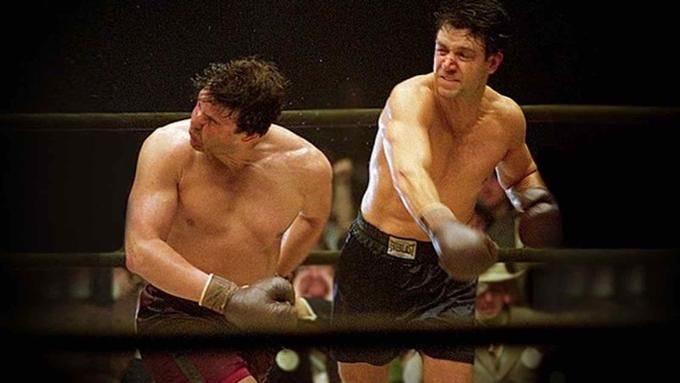

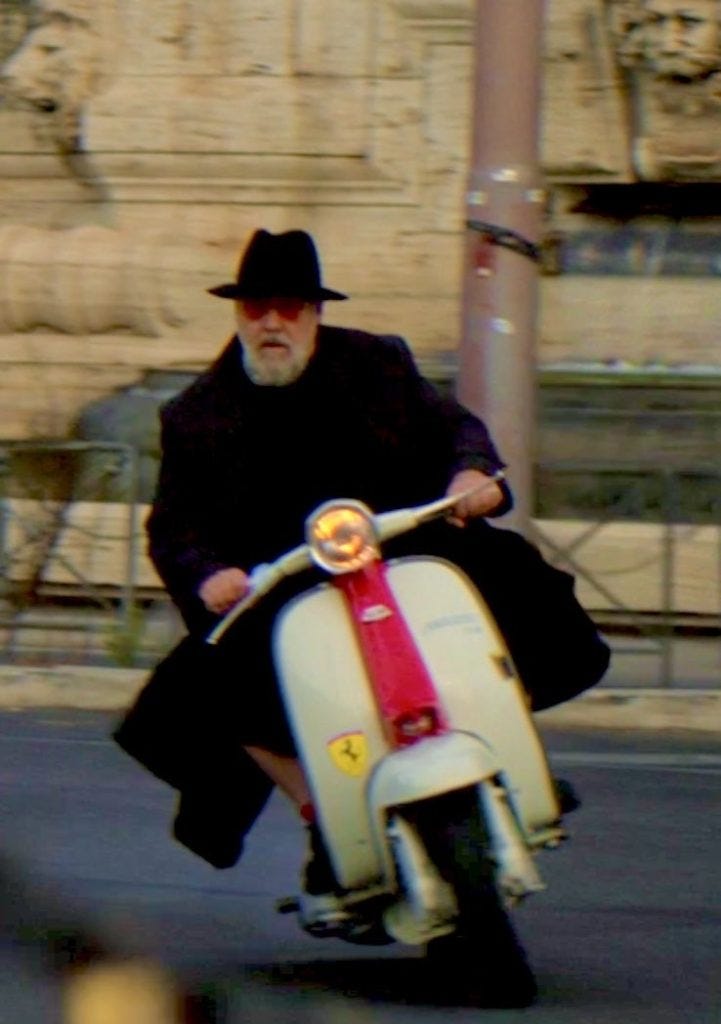

1) Who didn't obsess over Joaquin?, 2) Russell in Les Mis was the best. He was the worst part, but he took it so serious, showed up for all the promos, and sang along side real singers. We loved him for it. 3) His career has the mark of an Australian Nick Cage. We need these men. At least they're interesting - try writing more than a paragraph about uh, Channing Tatum or Jacob Elordi.